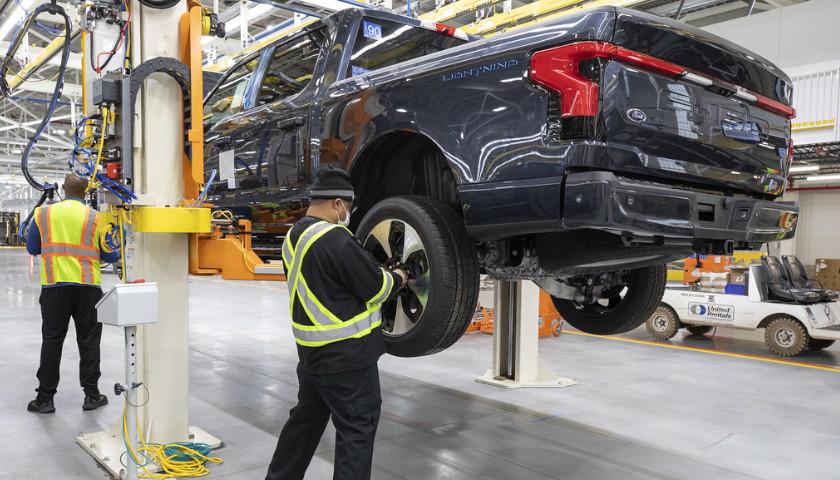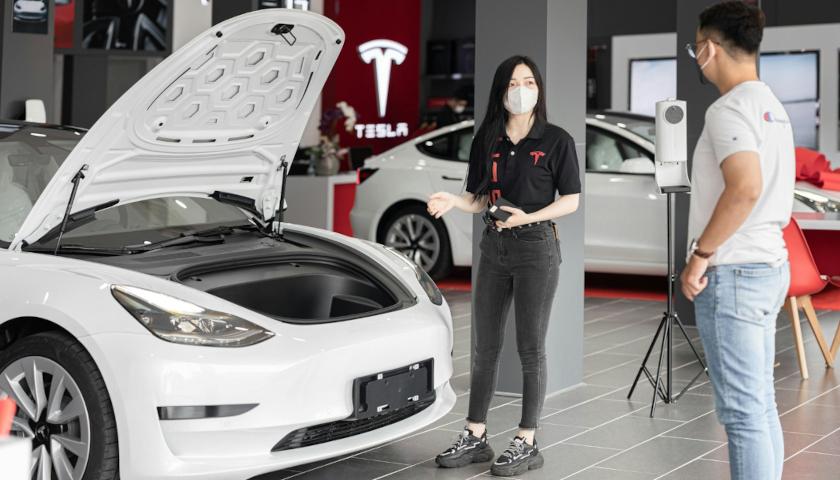Live from Music Row Tuesday morning on The Tennessee Star Report with Michael Patrick Leahy – broadcast on Nashville’s Talk Radio 98.3 and 1510 WLAC weekdays from 5:00 a.m. to 8:00 a.m. – host Leahy welcomed Mayor Andy Ogles and Americans for Prosperity Grassroots Director Grant Henry in studio to discuss previous failures of large corporations being funded by Tennessee taxpayers and the need to look more closely at the rushed Ford deal.
Leahy: In studio with us, the grassroots director for Americans for Prosperity, Grant Henry. Good morning, Grant.
Henry: Good morning, sir.
Leahy: And also joining us, the mayor of Maury County, that ambassador of freedom and turbocharged engine of economic growth Maury County’s Mayor Andy Ogles. Good morning, Andy.
Ogles: Good morning. I forgot to hit the red button.
Leahy: We planned this precisely because we knew that the issue of the Ford Motor Company $900 million package of incentives in the Tennessee General Assembly special session would come up today on Tuesday when you are planning to be in here, Andy.
We knew that. Since you’re the mayor of Maury County, wherein, I think, 1990, the Saturn plant opened up before General Motors. It was really kind of the first entry into incentives for large manufacturers to come to Tennessee.
That was 31 years ago when they opened up. I’m very curious to see your thoughts as to the merits of this $900 million dollar incentive to bring a Ford plant to build electric pickups to West Tennessee. Haywood County.
And how does that compare to the Saturn plant now, the GM plant? And overall, 30 years later, did taxpayers get their money’s worth for the incentives provided in that Saturn plan?
Ogles: So this is a challenge. My understanding is this is a joint venture between Ford and another company.
Leahy: The other company is a manufacturer of electric batteries.
Henry: SK Innovations.
Leahy: Thank you.
Ogles: One of the challenges that you run into is if you go back in time into the mid-80s, when the original pilot, the pilot is the incentives from the local Maury County which was based on a manufacturer that would ring 8,000 jobs into Southern Middle Tennessee.
Leahy: That was the promise back then.
Ogles: That’s right. And part of that was because there was a headquarters there, et cetera.
Leahy: The planned headquarters of the new division, now extinct Saturn. A new division and the first division of General Motors in 50 years. It was the brainchild of Roger Smith. Roger Smith little kind of connection.
His daughter, Jennifer, was a classmate of mine at Stanford Business School. But he was also the object of Michael Moore’s hilarious documentary.
Roger and Me. Lefty Moore made his name by making fun of Roger Smith, who is a good guy and a forward thinker. But that was his vision. Saturn.
Ogles: As we know now that the Saturn brand went away, it went extinct.
Leahy: Boom! And it was sort of like a new venture. To some extent, Tennessee taxpayers provided much of the venture capital to General Motors to launch the Saturn brand, which did well initially but never made it. And now it’s gone.
Ogles: And Tennessee taxpayers are about to spend almost a billion dollars on a new entry into the marketplace from a different car manufacturer. So if you look at learning from history, you have a venture that went out of business.
The localities based a pilot off of it off of 8,000 jobs. It was a 20-year pilot that was ultimately renewed. And so when those jobs go away, suddenly the locals are upside down on the math.
Leahy: How did the jobs work if you look at the promise of the Saturn plant because the plants still exist and they still make pickups. And what do they make down there?
Ogles: So the Cadillac, the new Lyric. There’s an expansion going on there.
Leahy: They still use it. And it’s probably one of their more efficient plants from what I can tell.
Ogles: When you look at their inventory, it is the top two campuses in the General Motors portfolio. But the difference is they employ 1,300 to 1,400 individuals versus 8,000.
Leahy: Ah! Now, this is very important. The promise made in 1990 is they would employ 8,000. They employ now 1,300. I’ll do the math on that. It’s less than 20 percent.
Ogles: That’s right. So again, the Devil’s in the details on these incentives. What are those clawbacks? What period of time do they have to maintain these jobs? Are there any protections from the localities?
What I can tell you is the state and the localities are kind of left to their own to work out the details of their pilots. It is done in relation to this state. But it’s a weird dance.
And I know that because I’ve just helped negotiate the largest deals in state history with the expansion of General Motors. And then the addition of the battery plant to Maury County.
It should be noted that the incentives given to those two are nowhere, not even close, not even remotely in the same ballpark as this billion-dollar incentive to Ford.
Leahy: Now let’s just go back to the Saturn plant that’s now a General Motors plant in Spring Hill and Maury County. In 1990 they started operation and promised 8,000 jobs. There are only 1,300 jobs now. Did Maury County taxpayers get their money’s worth on that investment?
Ogles: General Motors has been a good partner in our community. And so there’s been some benefits there, obviously, and continue to. It’s been part of the foundation of our continued growth over time.
But does the pilot match the original deal or does the outcome of the deal match the pilot? And the answer to that question is no.
Leahy: If you went back to 1990 when the governor there was promoting this idea in the state, everybody was all excited about it. And I see the same pattern now.
I don’t think anybody is going to ask the hard questions. I think this is moving through the General Assembly, like a freight train. If you excuse the transportation metaphor, there. (Chuckles)
Henry: The other part of the problem, Michael as the way I see it is we’re talking about this idea of clawback provisions. And to what extent do we get something back from the numbers of jobs promised and the number of jobs actually delivered?
Another wrinkle on that, too, is how many jobs are actually going to Tennesseeans? That’s a totally different question. But unless I’m wrong and someone tells me if I am wrong, I’m fairly certain it’s left up to ECD, the Economic Community Development to pursue those clawbacks.
And I think they’ve only done so, like, two times in 20 years or something. It’s a difficult thing now because these clawbacks are there.
But for me, in some sense, it’s like how much of protection is that really for Tennessee taxpayers if we’re so infrequently so rarely actually pursuing those?
Ogles: The other thing, too, is it’s a joint venture between Ford and another company, so they’re most likely setting up another entity. So if a said entity goes out of business, Ford is still there.
Leahy: There’s nothing to clawback.
Ogles: There’s nothing to clawback.
Leahy: That’s a little detail, Andy.
Ogles: Facts matter. I’ll be honest with you. Over the weekend, I had some calls from legislators who were somewhat frustrated by this process in that that they’ve basically been told to approve it or else.
And like you said, it’s a freight train moving through Tennessee. And I don’t know, even if it needed to be stopped, there’s no stopping it.
Leahy: I don’t think there’s any stopping it. However, I think, for the record, it would seem to me that somebody in the state legislature should step up and say, I know we’re all excited about this opportunity.
But here are the main issues that we really need to discuss more thoroughly before we approve this. And it’s just going to be for, I suppose, a 10 year later, I told you so moment, perhaps.
Henry: There are going to be legislators that will stand up and say that now. I don’t want to put words in their mouth, but you can mark my words that will at least be a few. We have a history of companies in this state taking advantage of our tax dollars.
Tennessee Watchdog reported that six years ago, state officials gave Volkswagen $2 million in taxpayer money to use for marketing and public relations.
And they just took $266,000. of it and just plastered a big sign on the side of the building and called it, hey, even. Well, I don’t know what happened to the remaining portion of that money. But here’s what I’m saying.
If you can find a way to justify this style of spending and not call it corporate welfare, I just don’t know what ground you stand on later on when you’re saying, well, we shouldn’t justify this one coming up because it’s someone from Hollywood who wanted to shoot movies in my town. Now that’s bad all of a sudden. I don’t know where you have to have some consistency. Right?
Leahy: Andy Ogles, you just finished a negotiation with General Motors in your capacity of Maury County. Just give us a highlight of that before we go to the break. What did you learn? And then I want to talk to you after the break comparing the deals that you worked on with this Ford deal.
Ogles: Two separate negotiations, one with General Motors and the other one with LG Chem and their new battery plant. A total package of $4.3 billion between the two.
And again, the numbers for this Ford deal are staggering. There was no special session required on either of the other two deals.
Leahy: So small.
Ogles: Much much smaller.
– – –
Tune in weekdays from 5:00 – 8:00 a.m. to the Tennessee Star Report with Michael Patrick Leahy on Talk Radio 98.3 FM WLAC 1510. Listen online at iHeart Radio.
Photo “Andy Ogles” by Andy Ogles. Background Photo “Tennessee Capitol” by Peggy Anderson. CC BY-SA 4.0.








